Leh, the capital of Ladakh, has been culturally influenced for years. Leh showcases its ethnicity through its culture. Leh is not only known for its natural beauty and Himalayan landscapes but also for being home to multiple monasteries. Each monastery has a story from the past and belongs to different sects of Tibetan Buddhism. These Leh monasteries follow and reflect the traditions of the religion and have a deep connection with the residents and visitors. The monasteries in Leh offer insights into the teaching and learning of the sect and provide a glimpse into the spiritual life of the residents.
Top 10 Leh Monasteries
The Leh monasteries celebrate annual festivals and offer a meaningful time. By offering breathtaking views of the surrounding mountains, these monasteries also give cultural insights.
1. Spituk Monastery
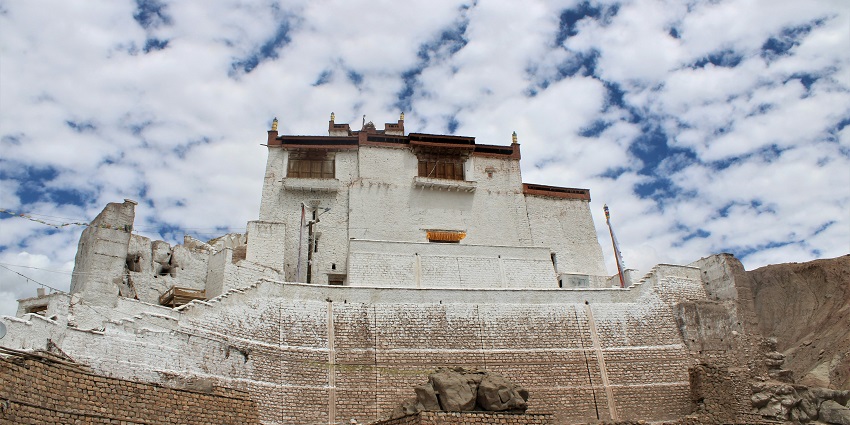
Photo: KANIKA PANT / Unsplash / Image For Representation Only
Spituk Monastery, also known as Spituk Gompa or Pethup Gompa, was blessed by Arhat Nyimagung, the one who has gained insights into the nature of existence and achieved Nirvana. This monastery is home to 100 monks and celebrates its annual festival, Gustor, every year in the eleventh month of the Tibetan calendar which attracts tourists and devotees across India. This monastery first belonged to the Red Hat sect of Tibetan Buddhism but later in the 15th century was taken over by the Yellow Hat Sect of Tibetan Buddhism. The Yellow Hat sect is also known as Gelugpa. It is one of the popular monasteries in Leh.
Distance From Leh: 6.6 KM
Suggested Read: Top Places To Visit In Kargil To Explore History And Unveil Adventure
2. Phyang Monastery
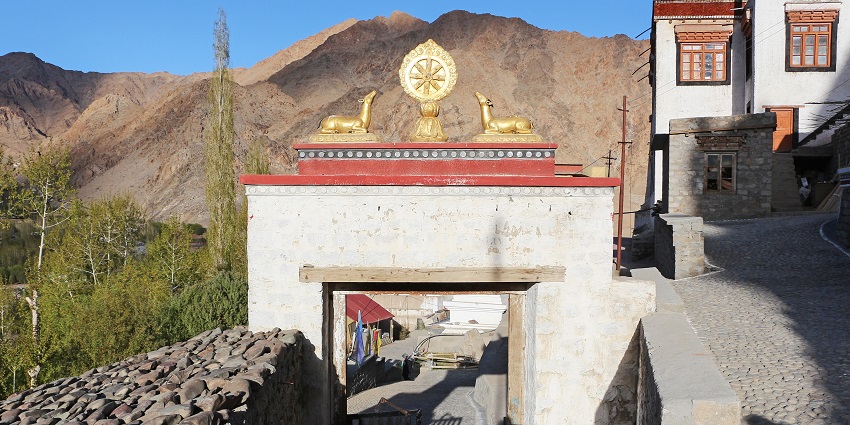
Photo: Bernard Gagnon / Wikimedia Commons
Phyang Monastery, also called Phyang Gompa is located in Fiang, a small village near Leh. The village lies 15 kilometres to the west of Leh and is easily accessible. Established in 1515, it is one of the oldest monasteries in Leh and even in the entire country. The monastery is perched on a hilltop and is similar to the famous Likir Monastery. It belongs to the Red Hat Sect of Tibetan Buddhism. Currently, this monastery belongs to the Delongpa order and offers breathtaking views of the surrounding mountains. It also hosts an annual festival where the traditional rituals, dance, music and local cuisine are showcased.
Distance From Leh: 19.1 KM
3. Lamayuru Monastery
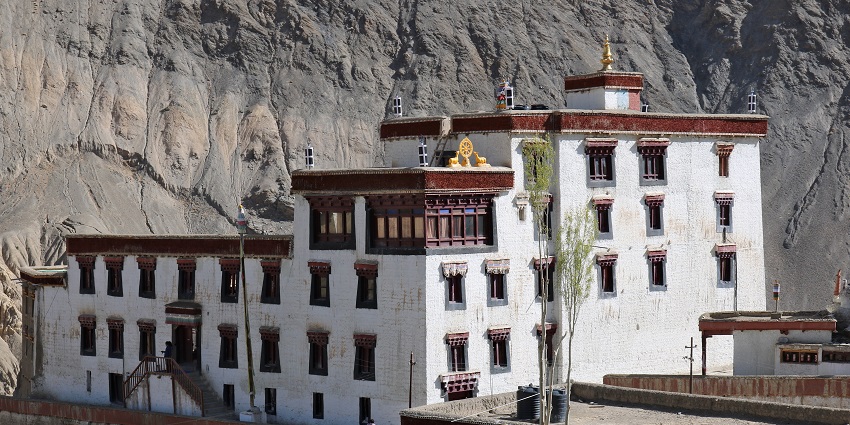
Photo: Ingo Mehling / Wikimedia Commons
Lamayuru Monastery, also known as Yuru Monastery or Lamayuru Gompa, is a Tibetan Buddhist Monastery located on the Srinagar-Leh Highway. The monastery’s name when translated to Hindi means Swastika. It is currently affiliated with the Drikung Kagyu school of Buddhism and is one of the best monasteries in Leh. There are 150 permanent monks at this monastery. In the past, the monastery had housed up to 400 monks. There are two annual festivals celebrated at this monastery in the second and fifth months of the Tibetan calendar. There are numerous paintings throughout the monastery.
Distance From Leh: 114 KM
Suggested Read: Places To Visit In Ladakh
4. Thiksey Monastery
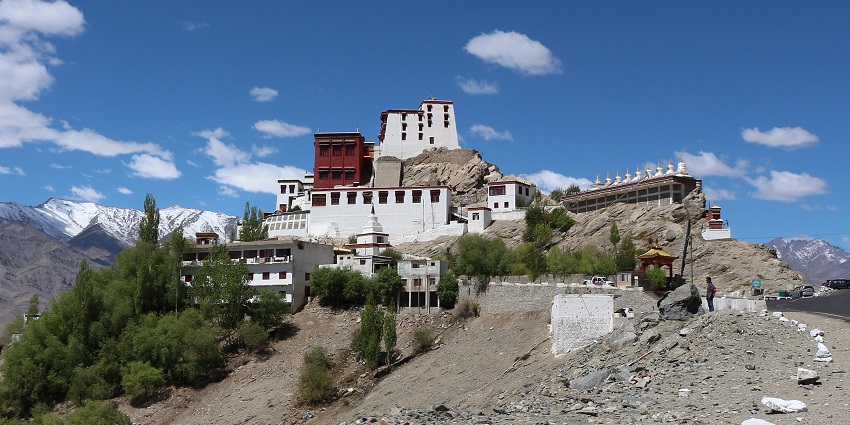
Photo: Bernard Gagnon / Wikimedia Commons
Thiksey Monastery is a big monastery near Leh. It is also known as Thiksey Gompa. It is a Buddhist monastery located on the top of a hill and is affiliated with the Gelug school of Tibetan Buddhism. The architecture of this monastery is beautiful and it has gained fame due to its resemblance to the Potala Palace in Tibet. This is the largest monastery in central Ladakh. There is a separate building for the female renunciates at this monastery. Located at an altitude of 3000 metres in the Indus Valley, Thiksey Monastery is a twelve-storey complex and is home to numerous Buddha statues, thangkas, stupas, swords and wall paintings.
Distance From Leh: 19 KM
5. Hemis Monastery
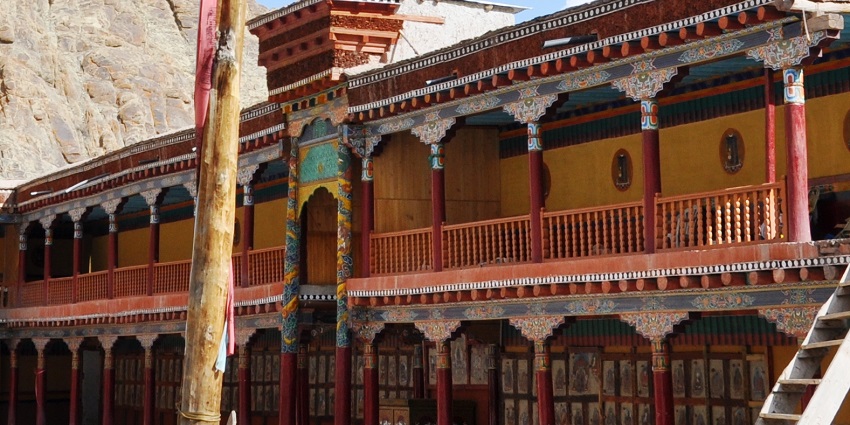
Photo: Prof Ranga Sai / Wikimedia Commons
Hemis Monastery is a Himalayan Buddhist Gompa located in Hemis on the bank of the River Indus. The monastery is 39 kilometres away from Leh. The site was re-established in 1672 by the Ladakhi King Sengge Namgyal. The annual festival of Hemis Monastery is in the early days of June. It honours Padmasambhava, who is the god of and reincarnation of Lord Buddha. In the courtyard of the monastery, there is a gallery of eighty-four Mahasiddhas which date back to the 17th Century. The paintings have gained fame as they have been created using ground mineral pigments.
Distance From Leh: 39 KM
Suggested Read: Things To Do In Leh To Seek Adventure And Beauty Amidst The Mountains
6. Shey Monastery
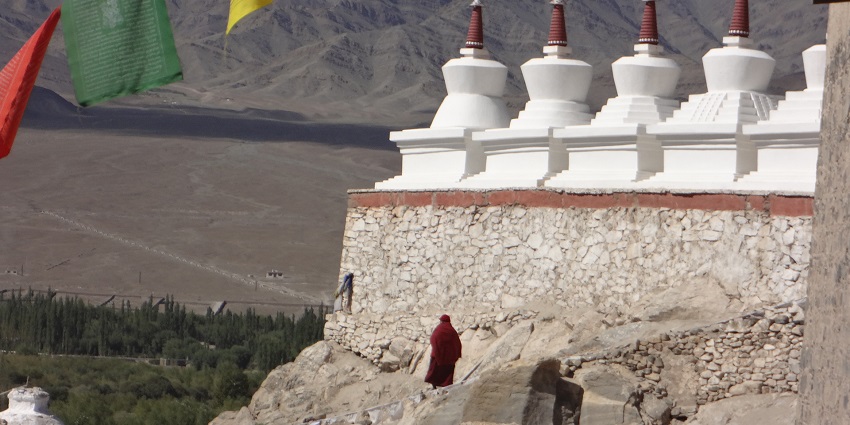
Photo: Mandlik.sachin / Wikimedia Commons
Shey Monastery and Shey Palace Complex, located together on a hillock in Shey, is a small village situated south of Leh. The monastery houses the huge Shakyamuni Buddha statue, which is considered the second largest Buddha Statue in Ladakh. The statue is a giant copper and gold statue. Named after Buddha, who was the sage of the Sakya people residing in the Himalayan Region back then. The palace and the monastery were built in 1655 on the instructions given by Sengge Namgyal’s son Deldan Namgyal. Located on the upper side of the Indus Valley, Shey Monastery offers breathtaking views of the surrounding hills.
Distance From Leh: 12.5 KM
7. Stakna Monastery
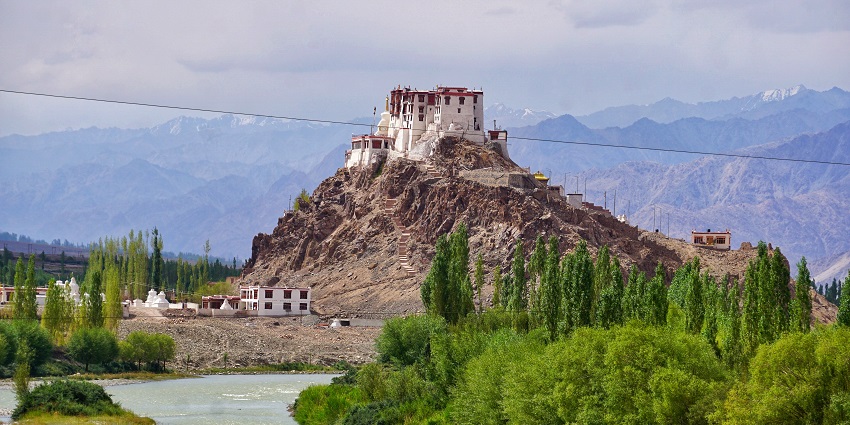
Photo: Deepank Ranka / Wikimedia Commons
Stakna Monastery is a beautiful place to witness in Leh. The monastery was founded in the 16th century by a Bhutanese scholar. When translated, the name means ‘tiger’s nose.’ The monastery was built on a hill which had a shape similar to that of a tiger’s nose. It is a residential place for the 30 monks who reside here. Stakna Monastery is considered the only Bhutanese Drukpa Kagyu monastery in Ladakh as all others are of the Gyalwang Drukpa’s school. The journey towards this monastery offers the best view, making it one of the popular monasteries in Leh.
Distance From Leh: 22 KM
Suggested Read: Enhance Your Vacation With These Things To Do In Ladakh
8. Likir Gompa
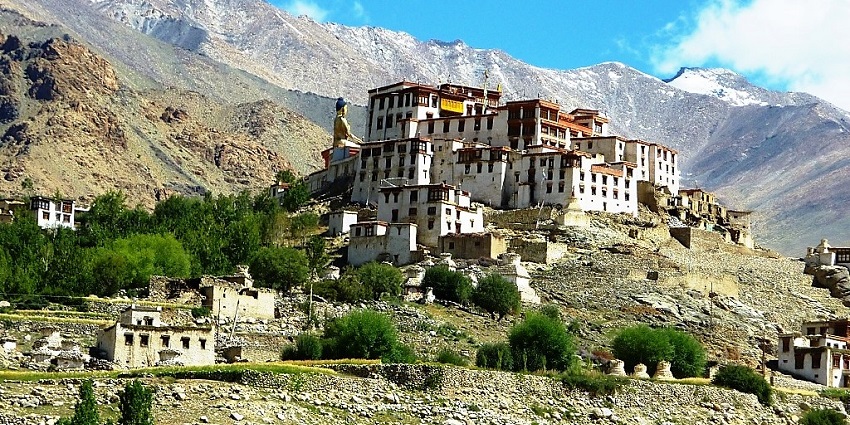
Photo: John Hill / Wikimedia Commons
Likir Gompa or Likir Monastery is one of the famous monasteries in Leh, Ladakh. The place is located just 52 kilometres to the west of Leh and is easily accessible. Perched at an elevation of 3000 metres, it lies on the Leh-Srinagar Highway. It belongs to the Gelugpa sect of Tibetan Buddhism. Founded in 1605 by Lama Duwang Chosje, it houses around 120 monks. There is a school too inside this gompa which has a count of 30 students. It teaches three languages, Hindi, English and Sanskrit.
Distance From Leh: 52 KM
9. Alchi Monastery
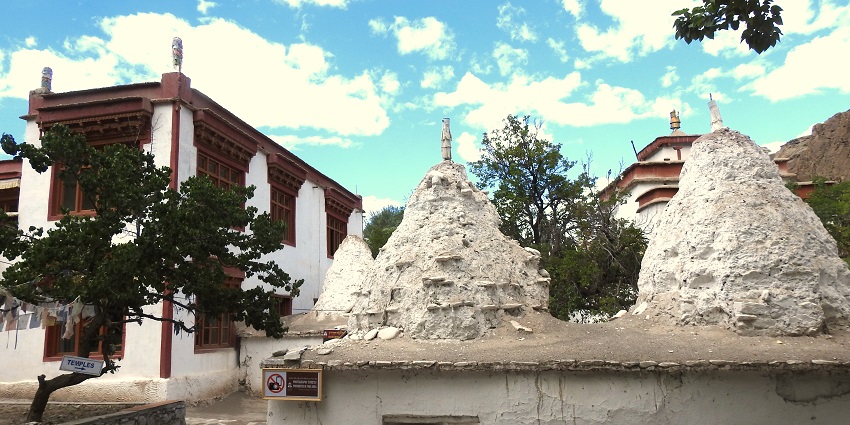
Photo: Harvinder Chandigarh / Wikimedia Commons
Alchi Monastery is widely known as a monastic complex in Alchi, a village in Leh district. The monastery is currently under the Ladakh Autonomous Hill Development Council of the Ladakh Union Territory. Alchi Monastery is administered by Likir Monastery. The monastery has the artistic and spiritual details of the Buddhist Kings and Hindu Kings who ruled the region, some parts of Kashmir and Himachal Pradesh during that time. It also houses some of the oldest surviving paintings in Ladakh. There are huge statues of Buddha with intricate designs carved out on the same.
Distance From Leh: 66 KM
Suggested Read: Adventure Sports In Ladakh – Planning The Ultimate Trip
10. Shanti Stupa
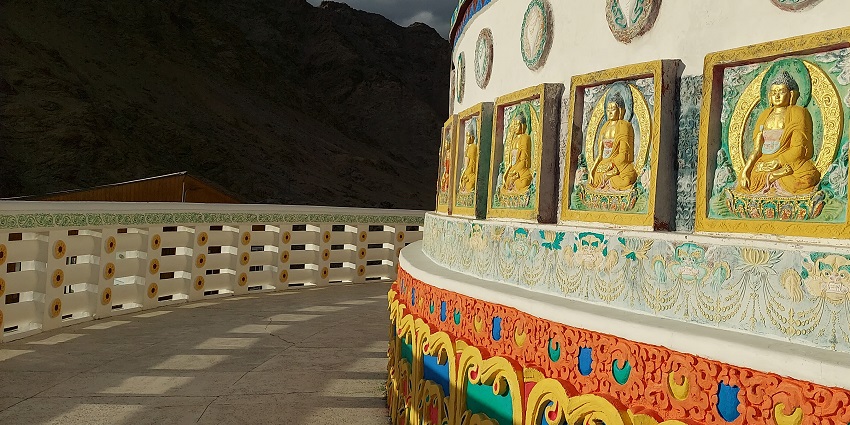
Photo: Bharatahs / Wikimedia Commons
Shanti Stupa is not a monastery but a Buddhist Stupa located in Leh, Ladakh. Perched on a hilltop at Chanspa, which is 4267 metres high, the stupa is white-coloured and has a dome. Built in 1991 by a Japanese Buddhist Gyomyo Nakamura, it is famous not only for it being the spiritual centre but also for the breathtaking views of the surrounding valleys and mountain peaks. Relics of Lord Buddha are displayed here which offer insights into the culture of Tibetan Buddhism.
Distance From Leh: 4.9 KM
Get a glimpse into the spiritual lives of the resident monks and locals of Ladakh by visiting these Leh monasteries. The monasteries perform the daily rituals and traditions which reflect the rich Buddhist culture. Visiting these places also enriches your trip as they offer beautiful views of the surrounding hills and mountains. Book a trip to Leh with TripXL, and visit these monasteries for a memorable experience.
Cover Photo: Kmohankar / Wikimedia Commons


 WhatsApp
WhatsApp
 Twitter
Twitter









